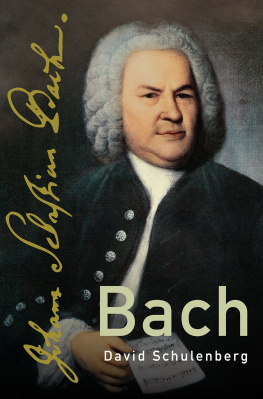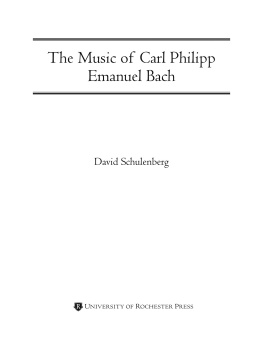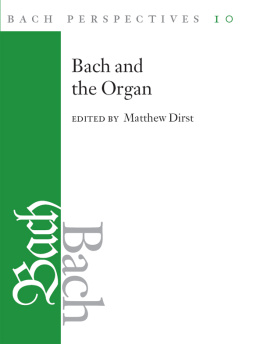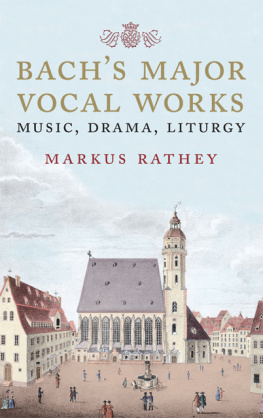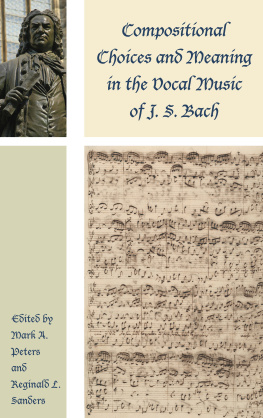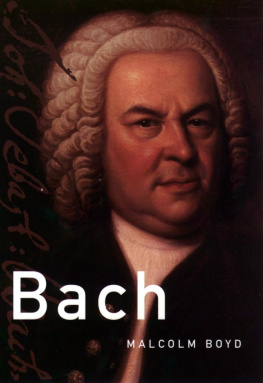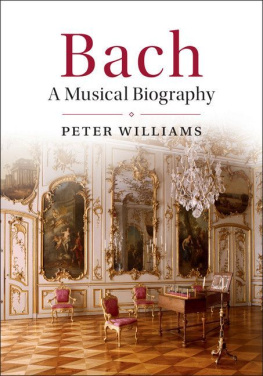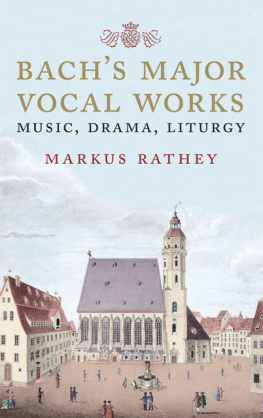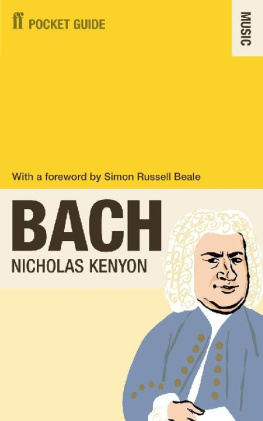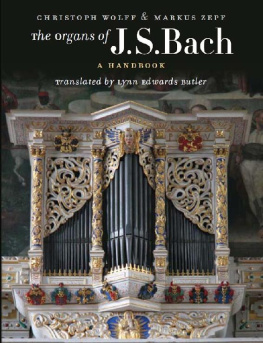T H E M A S T E R M U S I C I A N S
BACH
SERIES EDITED BY R. LARRY TODD
T H E M A S T E R M U S I C I A N S
Titles Available in Paperback
| Bach Malcolm Boyd | Musorgsky David Brown |
| Bartk Malcolm Gillies | Puccini Julian Budden |
| Berlioz Hugh Macdonald | Purcell J. A. Westrup |
| Beethoven Barry Cooper | Rachmaninoff Geoffrey Norris |
| Brahms Malcolm MacDonald | Rossini Richard Osborne |
| Britten Michael Kennedy | Schoenberg Malcolm MacDonald |
| Bruckner Derek Watson | Schubert John Reed |
| Chopin Jim Samson | Schumann Eric Frederick Jensen |
| Grieg John Horton | Sibelius Robert Layton |
| Handel Donald Burrows | Richard Strauss Michael Kennedy |
| Liszt Derek Watson | Tchaikovsky Edward Garden |
| Mahler Michael Kennedy | Vaughan Williams James Day |
| Mendelssohn Philip Radcliffe | Verdi Julian Budden |
| Monteverdi Denis Arnold | Vivaldi Michael Talbot |
| Mozart Julian Rushton | Wagner Barry Millington |
Titles Available in Hardcover |
| Bach David Schulenberg | Puccini Julian Budden |
| Beethoven Barry Cooper | Rossini Richard Osborne |
| Byrd Kerry McCarthy | Schoenberg Malcolm MacDonald |
| Carter David Schiff | Schubert John Reed |
| Chopin Jim Samson | Schumann Eric Frederick Jensen |
| Debussy Eric Frederick Jensen | Schtz Basil Smallman |
| Elgar Robert Anderson | Richard Strauss Michael Kennedy |
| Handel Donald Burrows | Strauss Laurenz Ltteken |
| Liszt Derek Watson | Stravinsky Paul Griffiths |
| MacDowell E. Douglas Bomberger | Tchaikovsky Roland John Wiley |
| Mozart Julian Rushton | Verdi Julian Budden |
| Musorgsky David Brown |

Oxford University Press is a department of the University of Oxford. It furthers the Universitys objective of excellence in research, scholarship, and education by publishing worldwide. Oxford is a registered trade mark of Oxford University Press in the UK and certain other countries.
Published in the United States of America by Oxford University Press
198 Madison Avenue, New York, NY 10016, United States of America.
Oxford University Press 2020
All rights reserved. No part of this publication may be reproduced, stored in a retrieval system, or transmitted, in any form or by any means, without the prior permission in writing of Oxford University Press, or as expressly permitted by law, by license, or under terms agreed with the appropriate reproduction rights organization. Inquiries concerning reproduction outside the scope of the above should be sent to the Rights Department, Oxford University Press, at the address above.
You must not circulate this work in any other form and you must impose this same condition on any acquirer.
Library of Congress Cataloging-in-Publication Data
Names: Schulenberg, David, author.
Title: Bach / David Schulenberg.
Description: New York : Oxford University Press, 2020. |
Series: Master musicians series | Includes bibliographical references and index.
Identifiers: LCCN 2019055835 (print) | LCCN 2019055836 (ebook) |
ISBN 9780190936303 (hardback) | ISBN 9780190936327 (epub) |
ISBN 9780190936334
Subjects: LCSH: Bach, Johann Sebastian, 1685-1750. |
ComposersGermanyBiography.
Classification: LCC ML410.B1 S273 2020 (print) | LCC ML410.B1 (ebook) |
DDC 780.92 [B]dc23
LC record available at https://lccn.loc.gov/2019055835
LC ebook record available at https://lccn.loc.gov/2019055836
Contents
D. A Brief Guide to Sources (online supplement only)
E. Glossary (online supplement only)
To attempt a biography of one of the great artists in world history, a master musician in every sense of the word, is a daunting task. Not only do the life and works of such a figure raise complex issues and hard questions; the existing literature on the subject, in multiple languages, is too vast for any one author to read and master in a single lifetime. The previous volume on Bach in the present series, by Malcolm Boyd, went through three editions, each reflecting changing views and expanding knowledge of the subject. Boyds effort was, in the judgment of the present writer, ideal for its time and its readers in the balanced presentation of life and works, of fact and opinion. Other Bach biographies appeared during the publishing life of Boyds book, often providing new data and valuable insights but not surpassing it as a readable source of reliable information and succinct, well-reasoned criticism, for specialists as well as students and general readers.
Nevertheless, outlooks change, as do the interests of readers and authors. Writers of Boyds generation could assume that his readers shared a general knowledge of Bachs music and European history. Yet Boyd could not have originally expected his book to serve a global readership, who could access scores and recordings of any work by Bach with a few clicks of a mouse. Since 1983, when the first edition of his book appeared, performers have recorded Bachs complete works in historically informed interpretations, some reflecting radical new understandings of the scoring of Bachs vocal music. Social and economic systems, historical family structures, gender, non-elite and non-European cultures, and other areas of investigation have been opened up by scholars and are now seen to be relevant to the life and music of a master such as Bach. The very word master has become suspect, and the centrality of individual composers to the history of music is no longer taken for granted, replaced (in some approaches) by networks that involved also patrons, performers, and listeners.
Yet at least within the tradition that produced Bach, the individual composer remains a nexus within which lines representing culture, society, geography, and political economy all intersect. Somehow a substantial body of work emerged from the mind of a single musician, instructing, inspiring, and moving listeners and fellow musicians from his time to the present. This book aims to explain to contemporary readers how that came about.
It has often been remarked that Bach resembles Shakespeare in that we know very little about the person and a great deal about the works. Indeed it is easy to summarize the biographical facts about both men very quickly; for Bach, most of the essential data were already given in the first published biographies. The scholarship of the past two centuries has tended more toward deepening our understanding of Bachs social and cultural context, rather than revealing new facts about his biography. Scholars have also worked toward establishing a chronology of his compositions, and therefore of his inner life as a musician, although the process is far from complete. Gaps remain in our knowledge of how and when Bach composed important portions of his oeuvre, and we may never know such basic facts as when he wrote his first compositions or how many of his sacred cantatas have been lost. Clearly a reliable biography must avoid ungrounded speculation about such things. On the other hand, the Bach of conventional scholarship might be based too unimaginatively on those sources that happen to survive.

